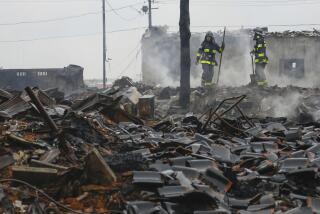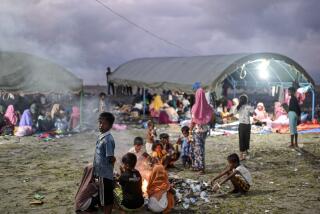Father’s Grip No Match for Wave
- Share via
NAGAPPATTINAM, India — To save his only son, Vijay Kumar hugged the boy as hard as he could. But in the struggle against the horrific power of the waves, that last embrace just wasn’t enough.
Kumar fought hard. He refused to let the first wave take 3-year-old Rajaraman when it lifted the pair to the height of a two-story building and whirled them around.
He wouldn’t let go when the wave bashed father and screaming child against snapped trees, tumbling chunks of concrete and other debris as they tried to keep their heads above the choking, dark water.
But then the tsunami dropped them as quickly as it had snatched them, and something wooden, a tree or piece of a smashed boat, hit Kumar hard in the back.
The force of the sudden blow threw open his arms. The water pulled Rajaraman away and down into a roiling torrent, and all his father could do was watch the terrified face of his son as the boy disappeared.
On Tuesday, Kumar still had not found his son’s body, so there cannot be a burial, a proper goodbye. And a father’s heart is as empty as the menacing ocean is deep.
“What else is there left in life? I have lost my son,” he wept outside the ruins of his home in the port area of this southern Indian city. “My God, what did we do wrong to lose him?”
At least 2,500 people died in this city Sunday morning, a majority of them women and children unable to fend off the three waves that struck in succession, tossing dozens of fishing trawlers around like playthings and dropping one upside down on the pedestrian bridge that joins two parts of the port.
The waves rolled hundreds of yards up the street leading into the port’s customs compound, leaving dozens of corpses in the road. Volunteers who helped collect the bodies said they found several dead women clutching the corpses of small children.
Hundreds of bodies were still believed buried under the sand along the city’s beaches Tuesday, and the stench of death filled the air. Many of the residents wore surgical masks, hoping to ward off the sickly sweet smell.
Worried that rotting corpses could take more lives by spreading disease, health officials ordered them collected in city trucks and dumped in mass graves. Many were buried before they could be identified.
More than half the dead were children, and burial teams continued to pile their corpses in mass graves Tuesday, mainly with women and the elderly.
The survivors are left to live with tormenting questions: Could they have done more? Did they try hard enough to save the children who weren’t strong enough to save themselves?
“I’m the only one in my family now,” said Nagaraj, 45, a fisherman who sat dazed on a broken slab of concrete with his last few belongings stuffed in a plastic bag by his bare feet. “A family of four, starved of humanity, by three flooding waves,” he added, and his voice trailed off.
Nagaraj, who like many Indian Tamils goes by one name, managed to ride out the waves by holding on to a large chunk of tree bark and bodysurfing the raging waters.
His 80-year-old mother, Ponnammal, his wife, Valli, 40, and their 7-year-old son, Rishekeshan, disappeared in the water.
“And there are multitudes of other children orphaned,” he said. “The shock has been so severe that we can’t even explain what’s happened with fate, God’s or nature’s, just yet.”
Kumar’s mother, Uma, was nearby when the first wave came out of nowhere and crashed down on the family’s two-room brick home, knocking half of it down. The waters left several hulking fishing boats up to 48 feet long in the street out front and in the backyard, beside smashed cars.
When the family saw the tsunami racing toward the shoreline about 100 yards away, it was already too late to do anything but stand in terror.
“It was 9 o’clock sharp when we heard people running, yelling and wailing,” she said, and her voice broke. “And then, without a moment’s notice, the horror struck us. I was thrown almost 20 feet up and then back down. This happened three or four times before I could hug a bamboo pole and escape.”
Kumar was asleep when he heard what he thought was a loud crackling noise, as if an enormous fire was racing through the port.
“I came to ask my mother in our snacks shop what the burning sound and the commotion I heard were,” he said. “At that instant, the angry sea invaded our little house like a thick, black mass of water.”
His son was swept away as the wave retreated. At least 15 minutes later, another surge smashed into the home.
“The sewage systems collapsed. The saltwater and sewage choked our mouths and nostrils, and the tide was overwhelmingly powerful. I could only hold on to my wife and daughter, and we were thrown about 300 yards before we formed a chain with other adults to hold on to anything sturdy.”
Kumar’s wife was seriously injured and hospitalized. But their 18-month-old daughter, Bhakiyalakshmi, was small enough for him to hold tightly like a ball and not let go. She survived.
Ravi Francis, 33, lost his four children to the three waves, which he said hammered his village on Kallar River next to Nagappattinam every 30 minutes. The first hit as the family was eating breakfast. In the last seconds that Francis saw his three daughters alive, Maniyarasi, 3, Prema, 8, and Sivashankari, 10, were desperately trying to hold on to the windowsill as the water pulled at them.
The body of their brother Vijayabalan, 9, hadn’t been found. But two of the girls’ corpses were found half a mile away from their home, dumped by the retreating waves near the river. Another was stuffed deep inside a tangle of thorn bushes.
“My daughters are together with the human rubble in mass graves now,” Francis said. “But I have decided to pick up the threads of my life once again. At least I have my wife and mother to turn to. I console myself with that thought.”
More to Read
Sign up for Essential California
The most important California stories and recommendations in your inbox every morning.
You may occasionally receive promotional content from the Los Angeles Times.













